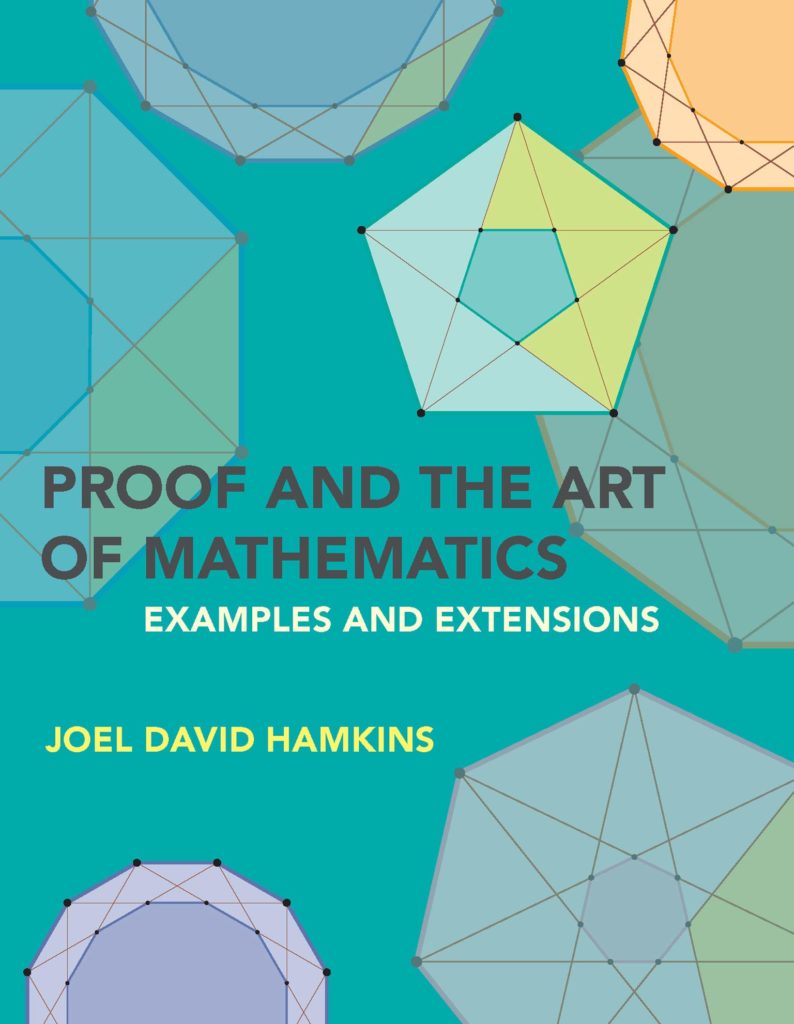My book, Proof and the Art of Mathematics (MIT Press 2020), has been awarded the 2024 Daniel Solow Author’s Award by the Mathematical Association of America.
The MAA asked me to write a brief response to receiving the award…
One of the great pleasures for any mathematician is to share the fascination and wonder of mathematics with those who are eager to learn it—to teach aspiring mathematical minds the art of mathematics, watching as they bend the logical universe to their purpose for the first time. They bring one idea into reactive contact with another, and we observe a carefully controlled explosion of insight, an Aha! moment, the natural consequence of clear and correct mathematical proof. What a joy it has been for me to experience these moments with my students using my book Proof and the Art of Mathematics, and I am truly honored by the recognition of the Daniel Solow award for this book. I am so glad to learn that others have understood so well what I was trying to do with the book and that they also have benefitted from it.
The book is filled with theorems, good solid theorems, theorems which even experienced mathematicians find compelling, but all of them are amenable to elementary proof. I find it an ideal context for teaching the craft of proof writing, showcasing a range of proof methods and styles. Many theorems are proved several times in completely different ways, using different argument methods that engage the problem from totally different perspectives. One thus realizes how a mathematician’s mind expands.
Every chapter ends with a discussion of various mathematical habits of mind, tidbits of wisdom on how to be a mathematician. State claims explicitly, not only for the benefit of your readers but for the clarity of your own conceptions. In your mathematical thinking and analysis, Use metaphor, which can provide a scaffolding of thought for otherwise difficult or abstract mathematical ideas. For mastery and insight, Express key ideas several times in different ways, thereby exploring your concepts more thoroughly. In every mathematical context, Have favorite examples, for they provide a playground of test cases to deepen understanding.
For a taste of the book, let me ask you: If two polygons have the same area, can you cut the first with a scissors into finitely many pieces that can be rearranged exactly to form the second? You’ll find out in chapter 10. What about a square and circle of the same area, allowing cuts along curves? What about higher dimensions?
The book has a supplementary text with many further examples and extensions of the ideas and discussion, including answers to all the odd-numbered exercises and more.
See also the nice announcement at Notre Dame.



Congrats!
Well, I think it’s clear that the study of the Foundations of Mathematics is disrespected and/or discouraged at many MAJOR educational institutions to this day. Including major mathematical institutions, or all places. And not knowing the basics about the foundations of the subject which one is studying does not seem wise to me.
I think that is changing with LEAN. FOM is in vogue again… partially because Terry Tao is setting a good example.
I love skyscrapers. I also love skyscrapers built on solid foundations. I’m also glad someone keeps an eye on those foundations, especially if there’s a flood or the wind is blowing or if there is any question regarding the safety of the structure as a whole, or, etc…
But without criticism I’m shocked at the disdain some mathematicians have for FOM. FOM need not be ONLY an esoteric mind-bending art, it can be simple and concrete, something that can fit on one sheet of paper. Not all mathematical reasoning is formalizable, of course, but …. sigh.
Thanks for the congratulations!
But I don’t really agree with the other part of your sentiment, for in my experience logic and foundations gets enormous respect in mathematics. Mathematicians are quite commonly recognizing the importance of foundations to many mathematical research efforts. If you look on MathOverflow, for example, there are many dozens of cases, perhaps hundreds of cases, where prominent non-logic users asked questions that turned on issues in set theory or model theory. I learned so much by interacting with these questions. Over the past 15 years I have strived to be an ambassador for logic on MathOverflow, and I think I’ve done so effectively.
Decades ago, in my undergraduate and graduate student days, I recall when logicians would sometimes complain about the situation of logic within mathematics. But based on my experience since then at many institutions, from elite universities down to common, in the US and elsewhere, I am pleased to say that the situation seems to have changed dramatically. Mathematicians today typically give enormous respect to logic and foundational research, and they are generally far more knowledgeable about it now.